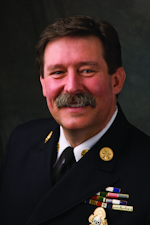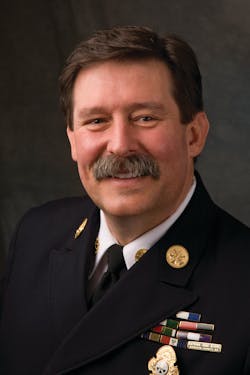A few months ago, I was flying home from Dallas when I had the fortunate opportunity to sit next to a recently retired Delta Force hostage rescue sergeant who was now working with the Department of Homeland Security. He saw the Maltese cross on my shirt and asked if I knew some of the firefighters he recently trained in active shooter simulations.
When I explained my focus on fire service litigation, he asked about the types of lawsuits that the fire service experiences. We discussed some of the various cases in the headlines, including a recent wrongful death lawsuit out of Beaumont, TX, where a firefighter who participated in a strenuous survival training exercise died from heat stroke and dehydration.
Specifically, Neal Wade Smith, 46, died in September 2012 while undergoing an advanced program referred to as a “smoke divers” class. His family sued claiming the instructors inappropriately used a “military boot camp” approach despite 90-degree-plus conditions, and failed to render aid immediately to Smith when he collapsed, instead telling other students to walk around him implying that he was not tough enough.
My new friend was horrified. I asked what the military was doing to manage the risks associated with comparable strenuous physical training and, in particular, how they managed the safety parameters to avoid such outcomes during warm weather training.
The Army’s approach
He said that when not actively deployed, he served as a drill sergeant for the Delta Force hostage rescue training program. He had been through the Army’s instructor program where soldier safety was emphasized as being the highest priority. Allowing a soldier to die of heat stress or dehydration during training would inevitably lead to a court marshal, if not criminal charges against the drill instructor.
The Army provides extensive training to its instructors on safety in general and on dehydration and heat stress in particular. The Army makes it clear that the safety of soldiers in training is an affirmative obligation of the instructor. At the first signs of dehydration or heat stress, instructors are required to take action to protect the safety of the soldier.
To demonstrate just how important safety during training has become even for an elite unit like the Delta Force hostage rescue team, my friend related a story that happened years ago.
Apparently several soldiers under his command were not “meeting expectations” when it came to an indoor rope-climb exercise. In a “motivational” exercise, he required them to climb their ropes, get into the building’s steel bar joists and hang upside-down by their legs with their arms crossed like bats.
As his soldiers were hanging like bats from the rafters his boss, a sergeant major responsible for all training entered the building. Observing the obvious risk, the sergeant major immediately called a halt to the “bat” exercise. While no soldiers were injured, the sergeant major seriously contemplated a formal court marshal for my friend, before opting for an alternative penalty.
My friend was required to stand for 8 hours with one foot inside Ft. Bragg and one foot outside Ft. Bragg, with the foot inside the base in a bucket of water. The penalty was intended to make it clear to him just how close he came to being court marshaled.
The incident made an indelible mark on my friend as well as every other instructor in Delta Force: We do not needlessly risk soldiers’ lives. My friend retired last year as the sergeant major of training himself.
Student safety first
All too often we hear stories of fire instructors who believe they are the latest reincarnation of Sergeant Hartmann from "Full Metal Jacket." With the best of intentions, they drive their students hard with what they perceive to be “tough love.”
There are instructors who say that if someone is not injured, the training is not realistic enough. Unfortunately, this kind of risk-taking, coupled with poor instructor training and lack of effective supervision, has predictably led to firefighter injuries and deaths. It has also led to innumerable lawsuits and in a few cases criminal charges against instructors.
If a military special forces unit such as Delta Force hostage rescue can demand safety during training, the fire service should insist on no less. Student safety ought to be a solemn responsibility of instructors. In addition, leaders who oversee training programs must take a proactive approach to training safety by holding instructors accountable for preventable injuries during training.

Curt Varone
CURT VARONE has more than 40 years of experience in the fire service, including 29 years as a career firefighter with Providence, RI, retiring as a deputy assistant chief (shift commander). He is a practicing attorney who is licensed in Maine and Rhode Island and served as the director of the Public Fire Protection Division at the NFPA. Varone holds a master's degree in forensic psychology from Arizona Statue University. He is the author of two books, "Legal Considerations for Fire and Emergency Services" and "Fire Officer's Legal Handbook," and remains active as a deputy chief in Exeter, RI.






